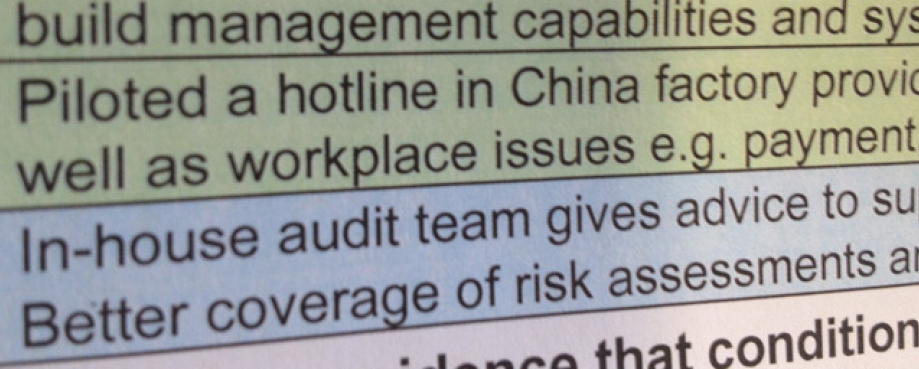
Peter Williams represents Home-Workers Worldwide and coordinates ETI's NGO caucus, which plays a key role in the analysis of annual reports submitted by our member companies. I talked with him about the trends emerging over the past year.
Overall, how do this year's company reports compare to previous years?
The stand-out trend is the amount of good practice being carried out by companies that are lower down the slopes of their ethical trade journey. We’re seeing the newer or smaller companies taking on projects that just a few years ago only the largest and most advanced of our members were committing to. It’s hugely encouraging.
This year we saw a garment-producing company in only its first full year of ETI membership trying a different approach to auditing. Instead of a regular factory audit, they worked with a consultant to lead a more thorough investigation into the root causes of problems and advised the factory on how to remedy these problems sustainably. When ETI produced its impact assessment back in 2006, not even the big high street players were piloting this kind of approach. I would place this level of undertaking as almost on a par with what ETI’s largest and most advanced company members were doing just 4 or 5 years ago.
So the newer members are learning fast from the more established ones?
Certainly there are more examples of good practice they can draw on, but it’s more than that. The growing awareness of how much of ethical trade is simply ‘good business sense’ is helping companies get out of the blocks much quicker, and avoid some of the pitfalls that the pioneering companies still contend with. For instance, larger companies are well aware of the need to get beyond the traditional model of audit and corrective action, but it’s a firmly entrenched approach that’s hard for them to swing away from. So to see such commitment and ambition from an entry-level company keen to try a different approach from the outset is really inspiring – it’s giving us evidence that smaller companies can implement the ETI Base Code very effectively.
And if you had to single out one good practice initiative from all the reports you saw?
One first class example we saw – and something that virtually any ETI company from achiever to leader level could be doing – came from a company that employs contractors to deliver public authority construction projects. They changed the conditions in their tender process to guarantee a set number of days maintenance work per week, for each of their contractors. This in turn meant that their contractors could make full-time employees of their workforce, rather than only offering short-term contracts with limited benefits. It’s a common sense initiative that will undoubtedly benefit people in that part of the company’s supply chain. It’s a reminder that while there are plenty of tough nuts to crack for companies wanting to act more responsibly, there are also some relatively simple solutions too.
ETI members can see a recent summary of good practice activities collated from member companies' annual reports.
